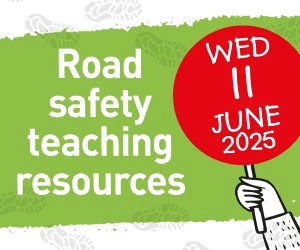Primary Times - the definitive what’s on and where to go family guide of activities and events for children of primary school age. Things to do with your kids during the school holidays including arts and craft activities, music and theatre for children, parties, competitions, days out, and family attractions along with term time drama schools, dance classes, after school clubs and sports activities. Things to do at a place near you!
NEW GUIDE LAUNCHED TO HELP YOUNG PEOPLE WITH DYSPRAXIA NAVIGATE THEIR WAY THROUGH SECONDARY SCHOOL
 Despite many of us proclaiming school days were the “best years of our lives” – the experience can be far from positive for the many teenagers who have been diagnosed with dyspraxia.
Despite many of us proclaiming school days were the “best years of our lives” – the experience can be far from positive for the many teenagers who have been diagnosed with dyspraxia.
In fact, the results of a recent survey1 commissioned by the Dyspraxia Foundation reveal that the secondary school environment can create huge levels of anxiety, fear or even dread for those teenagers living with the condition.
95% of parents and carers stated that their teenage child had experienced feeling of anxiety – due to issues such as being late for lessons, forgetting appointments, losing books or equipment and poor presentation of their written work. This was further supported by the fact that 40% of teenagers with dyspraxia who took part in the survey said they felt anxious “all of the time.”
Dyspraxia, a form of developmental coordination disorder (DCD) is a common disorder affecting fine and/or gross motor coordination in children and adults. It may also affect speech. Dyspraxia affects around 5% of the population (2%, severely) and males are up to three times more likely to be affected than females. Dyspraxia sometimes runs in families – and there are believed to be one to two children affected in every class of 30 children.
In response to these findings, as well as wider research and feedback, the Dyspraxia Foundation – the only national charity in the UK dedicated to raising awareness of the condition - has developed a new resource for teenagers [Dyspraxia: Hints and Tips for Teenagers] providing them with a practical guide to school as well as many other day-to-day tasks such as getting dressed and personal grooming, leisure activities, writing and typing, social skills and general domestic tasks including cooking, housework and time management.
In addition to the new, downloadable resource, the Dyspraxia Foundation has also introduced a new Youth Information Officer2, Claire Cripps (who joins the charity from a background of working with young people within the NHS). From January, Claire will be available to offer advice for young people experiencing difficulties associated with dyspraxia, whilst sharing information via the charity’s social media networks.
It is widely recognised that teenagers with dyspraxia are at greater risk of social isolation because their co-ordination difficulties may make it hard to participate in “socially-valued” activities such as playing an instrument or team sports. Indeed more than three quarters (77%) of those questioned in the recent poll said they avoided participating in sport, with 33% admitting they “always avoided such physical activity”
In practical terms, life in a secondary school environment presented a series of problems that many children of a similar age might take for granted. 53% said they had been late for school in the last half term – with 10% reporting that they were “always late’. And 90% said they had lost something important, such as keys, wallet or phone.
Sally Payne, Paediatric Occupational Therapist and Trustee of the Dyspraxia Foundation comments; “Growing up can be a ‘minefield’ for most teenagers but those who are already struggling with co-ordination, memory or organisation skills, the impact on self-esteem and confidence can be huge. Simple tasks, such as arriving at school on time, checking you’ve packed your school bag properly as well as the pressure of making new friends, means that many teenagers are stressed before they’ve even started their lessons. This level of daily anxiety can affect a teenager’s academic performance, participation in social activities and emotional well-being – not just during adolescence but also into adulthood and as they prepare to leave home and ‘fend for themselves.”
Earlier this year and in response to the survey, Children and Families Minister Edward Timpson comments: "No child should suffer from anxiety….and our reforms will help ensure children with dyspraxia get the support they need. Schools should now be clear about the measures they should take to prevent children and young people with special education needs and disabilities being bullied.
“The changes brought in by our SEND reforms put the individual needs of each child at the centre of a more simple and joined up system that focuses on helping them to achieve their best.”
India Carmody, is a teenager who is affected by dyspraxia and is currently preparing for her GCSE exams. She adds; "Life can be tough for all teenagers – but with the help of my family, friends and teachers, I have been able to work out some simple coping techniques which do make things easier and help me to keep on top of things.
“As people become more aware of dyspraxia I hope that teachers and other teenagers will understand that people like me are not being deliberately difficult, stupid or clumsy – we’re just a bit different and we need to tackle the tasks that others take for granted in a slightly different way.”




